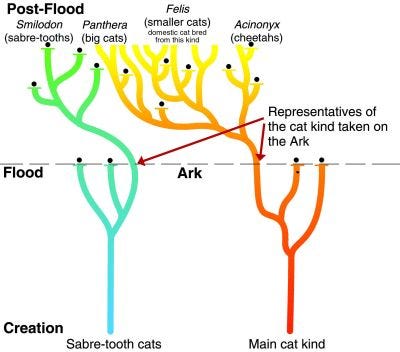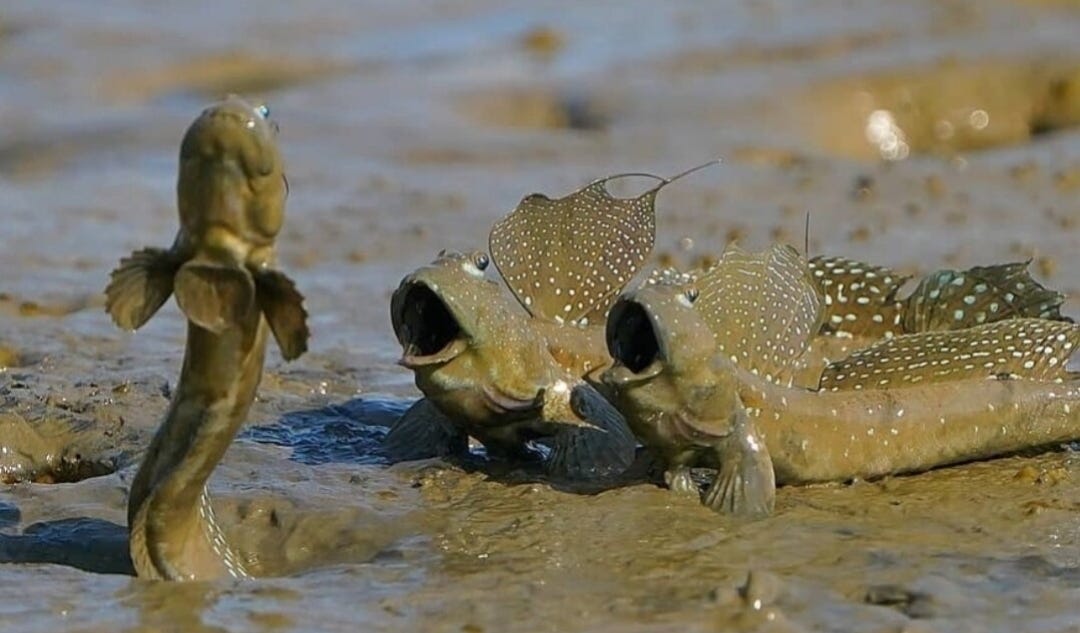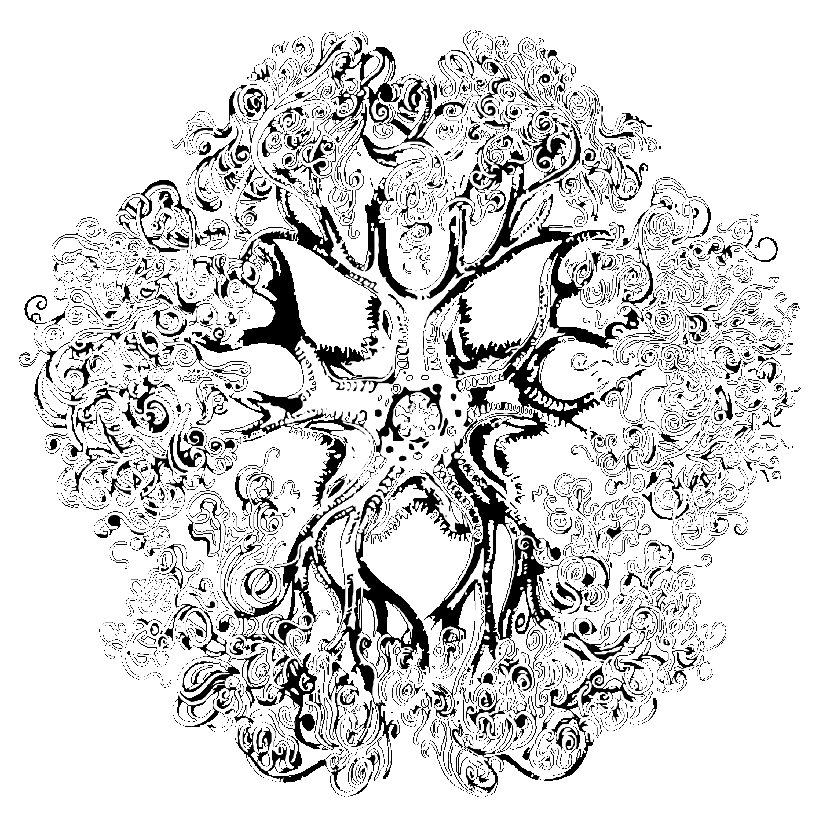The Macroevolution Fallacy
And, Observations on Christianity's Love-Hate Relationship with Science
When Darwin had published On the Origin of Species and The Descent of Man, it took only a few decades before the issue was settled in Europe. Any objection raised was minor in nature, as Europe had already been demystified of Genesis through advances in chemistry, geology, and archaeology. Darwin's achievement was merely assembling a new worldview from what previous decades had already shattered. Galton, Haeckel, and others readily carried the torch of evolutionary theory into the next century, and the rest is history. Eventually, even the Pope John Paul II was scolding critics of it, telling them: “fresh knowledge leads to the recognition of the theory of evolution as more than just a hypothesis.”
Except for, that is, in the United States. The American religious landscape has always had a peculiar and unique anaphylaxis towards evolution. 50 years after Darwin, the state of Tennessee finally recoiled against news from Britain, and passed the Butler Act banning any teaching of Darwinism and denial of the Genesis account in public schools. This culminated in the 1925 Scopes Monkey Trial, where the renowned “Great Commoner” William Jennings Bryan successfully prosecuted a teacher and upheld the constitutional validity of the Act. It wouldn’t be until 1968 when the Act was repealed and posthumously decreed as a violation of the Establishment Clause of the 1st Amendment by the Supreme Court.
The United States, far more agrarian, pious, and traditional than its cousins in Europe (just as the founders intended!), has always moved slower on issues where scientific discoveries demand a realignment in religious attitudes. In times such as these, I am certainly not going to complain about that. In the context of evolution however, this sentiment has not died out. Creationism is still practiced by the out-of-time villagers of the American heath, and it seemingly has little intention of hurrying its decline.
Creationism has, however, ceded territory in some significant ways. Bryan’s argument in Tennessee v. Scopes was that science, no matter what it may ever present, shall always be subservient to the revealed, infallible Word of God. He would be dismayed to learn that this has been entirely inverted in our day. Creationism, perhaps because it had no other choice, subjected itself entirely to the realm and methodology of science. In some ways, it is a type of science of its own. This inversion has spanned across the entire Christian enterprise: they apply modern physics to the Kalam Cosmological Argument, the Discovery Institute produces research articles on intelligent design and irreducible complex proteins, chemists study the blood type and pollen content of the Shroud of Turin in a field of science of its own making called turinology, and pilgrim-archeologists comb the entire Sinai and floor of the Red Sea for the tent stakes of Moses’ camp. In its attempt to win in a contest of truth against scientific materialism, Christianity has found itself entirely subservient to it. This is the great irony of an attempt to prove the Bible's independent validity and utility through entirely extrabiblical methodology. The cross is stuck under the microscope.
There is one specific flavor of this type of “scientific creationism” that finds itself nested today, and it is one that is particularly infuriating. It is the artificial distinction between two kinds of evolution: microevolution and macroevolution. The conjecture usually goes something like this: “Microevolution yes, macroevolution no… while we can observe minor changes within populations, we have never observed entirely new kinds of populations evolving. A dog cannot become a whale, and a monkey cannot become a man.” It is not difficult to find content that revisits the evidence and shows that this does indeed occur, and takes the argument to task directly. I will let that avenue be, and discuss problems with the general framing of this attempted undoing of Darwinian evolution.
Firstly, as discussed before, it is important to note the concessions made at the onset by the creationist argument. Rather than arguing that scripture overrules science by default as Bryans famously did, it has attempted a purely rationalist, scientific argument. Even more curiously, it has actually granted the process of evolution entirely: it states that descent with modification does occur, allele frequencies do change over time, and selective pressures do shape the structure of populations and the phenotypic and genotypic makeup of organisms. Creationists have learned that arguments against this has sailed, and any attempt to dispute it is credential suicide. Darwin's finches are taken for granted, as minor differences in beak size don't seem to threaten the idea of Noah's Ark all that much. This is therefore no longer a serious confrontation with evolution, but a minor plea to make room for pieces of Genesis in the story. Earlier creationists would have had a seizure upon learning that this is the ground of contention now, and it is clear where the trajectory of the argument is going.
Secondly, and central to the argument, is this formulation of the idea of a science of created kinds, or “baraminology”. These are classes or groupings of a kind of organism, such as a bird-kind, or fish-kind, cats, dogs, and of course - humans as a kind of their own. Within these kinds can evolution variation, certainly! Who could deny that bacteria could develop antibiotic resistance, or that a chihuahua comes from a wolf? These are, however, instances of variation within kinds. Bacteria could never become a chihuahua as evolution claims. All life on Earth does not come from a single ur-cell, rather, God in his divine act of creation ordered the existence of all of the various kinds of beings which continue to exist today as they always have, possibly these kinds where the ones who survived on Noah's Ark. The barriers between these kinds are strict and divinely ordained, now and forever. You can just feel the subconscious Christian love for Platonic forms oozing off the page. Irreducible complexity is likewise in this camp.
One would get dizzy from the acrobatics. It is difficult to see the point: you have already ceded evolution, you have already admitted Genesis is not exactly as we were taught. So what exactly is the point in this desperate attempt to keep Genesis in the equation? It is more fruitful to think of this as a bargaining chip. The point is not to present a cohesive view of evolution, it is to bite at the ankles of Darwin until a single sentence of Genesis can wiggle its way back into the fold.
Of course, this is never going to happen with this argument. There are several problems, not just in terms of evidence, but in theory and concept. For starters, these kinds and barriers between them are utterly imaginative and conjectural. Take mankind for example. Where does his ancestral cousins in Homo neanderthalensis, H. habilis, H. heidelbergensis, or H. erectus? Are these men? Did Jesus die for their sins? What about Australopithecus? What exactly is the definition for these kinds, and how does it securely and reliable differentiate them? No such definition exists. In an attempt to circumvent evidence of intermediate species, the argument has found itself tied up by that very evidence. In a way they're just reinventing the wheel: we already have a system where we classify populations into kinds, which roughly correspond to their traits. Why isn't mammal-kind, or vertebrate-kind sufficient? What we get instead is sort of a retard's taxonomy, which breaks the entire system by removing any kind of phylogenetic relationship purely because it conflicts with scripture:

The biggest problem, by far, is that by ceding the mechanism of evolution as entirely truthful the creationist argument has seeding its own undoing, precisely because there is no difference in kind between the mechanisms macroevolution and microevolution. In each instance, the results are produced by the exact same way: by the expression of proteins. You grant that evolution can cause a bird's beak to lengthen, and that it does this through inherited mutations which encode for gradually-different proteins which gradually increase its reproductive fitness, yet, you deny that the bird-kind could’ve been produced by this at all. On what basis, exactly? Again, there isn’t one. Of course a fish can become a dog and vice versa: the frequency of alleles changes within the population over time - slowly at once, and suddenly cut off from each other by extinction. The fake distinction between micro and macroevolution is therefore a case of trying to have one’s cake while eating it, a feigned submission to the idea of science but without being forced to reckon with its conclusions. Very few people are willing to submit to such a reckoning.
There is only one example of a serious attempt to propose such a “barrier” to the degree to which alleles can change, and it failed spectacularly: “The Waiting Time Problem”, kicked off by a paper from Behe and Snoke in 2004. This argument is likewise found downstream in diluted forms and memes, “A Darwin asking for another 10 billion years to evolve four hands”, etc. The point of contention is the time needed to accumulate mutations: once we quantify the amount of mutations required to change a fish into a bird, and the time required to generate those mutations under normal circumstances, we find that our evolutionary timeline took something around several trillion years, older than the universe itself. Obviously, that means that either evolution is wrong or that their model is wrong. Want to bet which one they decided on?
Again, the methodological rigor here is silly, and a million other people have brushed this aside on the granular-level points such as the neutrality of amino acid mutations (see this reply paper, showing that the “time problem” is no problem at all). What I am more interested in is on the more meta-level, this game of Russian Roulette that creationists are forcing themselves to play. The point of this paper wasn't to propose an alternative hypothesis of evolution, no such alternative explanation for population variation is proposed, it is to try to blow up the entire field of evolution at the foundation. So here we are, upset at science, engaging with science to refute science, so that someone else can make a novel science of Old Testamentology.
Is it not obviously clear which of the two wields the Scepter and the Orb at this point?
This has been, and continues to be, the toughest of all pills to swallow for Christendom. It is no longer the sole, or even primary, means of discerning truth. It has lost the Mandate of Heaven. When science moves, Christianity is free to interpret, digest, and recite where it pleases - but never may it disagree. Religions have ceased to create, and can only comment - any “nay” is a purely ceremonial protest. Why rely on the Didache to make arguments against abortion when we have papers on fetomaternal microchimerism, or brainwave scans of 6-week old fetuses?
When science moves in a direction that seems to be friendly to Christian conceptions, such as in the case of the Big Bang, there is much applause - “the last gulp from the glass science at last!” - but if this discussion slips out of their frame, such as in the case of Penrose’s Conformal Cyclic Cosmology, there is at first confusion, and eventually a silent realignment. “Oh see science is like, a religion and stuff…” sure, and it's routing every single one of your infantry columns and making a run for the cannons. What are you going to do about? The New Atheists may be gone, but this realignment isn’t going anywhere. Lovely as it was for Thomas Paine in Age of Reason to state that “It is from the study of the true theology that all our knowledge of science is derived”, science did not stop comfortably at the edge of the New Testament, and marches on to chapters of its own.
To continue on the theme of irony, the 20th and 21st century and its deployment of ruthless scientific materialism has proven to be (and will continue to be) a great selection pressure, a mass extinction event, for the religions and ideologies that are all-too-human. The everlasting distinction between man and nature as a difference of degree rather than kind has been the crowning achievement of Darwinism, and nothing yet has proven to be able to refute it on different terms. There is of course, a number of ways to harmonize religion and science (even for Christians), and I write constantly about a few of them. But at the end of the day, one must make like Perseus, and cover himself in Death before entering Medusa's cave to do battle on her grounds. Nature rules the day, and the religions, ideologies, and worldviews which find itself contrary to nature in any way will be forced to make the difficult choice to adapt, or die.
Some strains of religion, as we have seen, might be too deep in their newly-dug graves to climb out.






Very good!
Making the problem worse is that the whole idea of Genesis seems to have been inspired by Plato’s Timaeus. In other word, a human creation inspired by a Greek philosophy.
https://vridar.org/series-index/plato-and-the-biblical-creation-accounts-gmirkin/